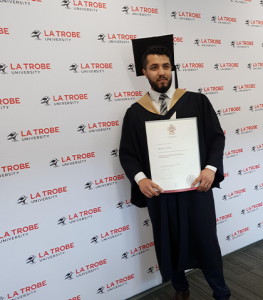New scheme to give refugees access to university
A group of Australian universities are set to launch a program to give refugees access to tertiary education.
The 12 universities, with support from the federal government, aim to give refugees from conflict zones the opportunity to take up fast-track study programs on their campuses.
Led by the Australian National University, the program will see changes to make it much easier for talented people forced from home by conflict to exchange their refugee camps for study in Australia.
 The ‘Australian Refugee Welcome University Sponsorship Consortium’ will particularly target people who have had their higher education interrupted in their home countries by war.
The ‘Australian Refugee Welcome University Sponsorship Consortium’ will particularly target people who have had their higher education interrupted in their home countries by war.
ANU spokesperson Professor Bronwyn Parry said the program aimed “to create life-changing resettlement and educational opportunities for hundreds of students who have been displaced by conflict in recent times, offering them the chance to re-start their educational journeys and to bring their skill and expertise to Australia,”
Professor Parry worked on a similar program in Britain where official bodies identified displaced people who had the potential to study at universities there.
A similar program has been running in Canada since 1978.
The 12 universities signed involved are the ANU, the University of Canberra, Charles Darwin University, Charles Sturt University, Curtin University, Deakin University, Griffith University, the University of Melbourne, the University of South Australia, the University of Technology Sydney, the University of Tasmania and Victoria University,
“But we look forward to expanding the partnership as other universities join,” Professor Parry said.
The plan follows the federal government’s decision to increase the annual Refugee and Humanitarian Program to 20,000 places in the coming year, and to welcome an additional 10,000 refugees over time.
Refugees in camps run by the UN refugee agency UNHCR are eligible to get a visa to come to Australia on humanitarian grounds but getting a university education is difficult.
The scheme plans to streamline the process by identifying suitable students outside Australia, and to put a network of support in place in the university which accepts them.
Refugee students also find it difficult to get student loans through federal funding which is available to Australian students.
Help could be as basic as teaching refugees how to negotiate the paperwork of officialdom.
Prof Parry said that if the scheme is successful, it could be expanded.
Its backers say it would give opportunities to refugees but also benefit Australia by bringing talented people to the country and into the labour force.
Afghan refugee engineer Mustafa Ayobu said the scheme would have helped him on his professional journey.
He arrived in Australia at 18 and set out on a 12 year process to qualify as an engineer.
“I was the first person in my family to go into higher education but now my younger brothers are following in my footsteps. I am proud to be a role model for them but I faced many challenges and barriers completing my degree,” Mustafa said.
He said there were many talented refugees who would be an asset to Australia if they could find a way of getting an education.












